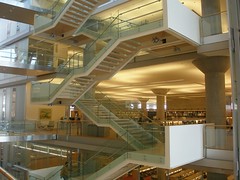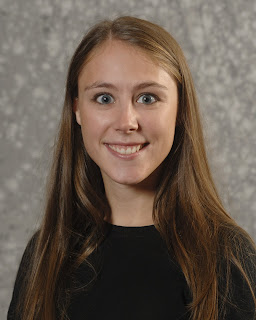April 28, 2008
Web 2.0 CE - Week 8: Mashups and API
I found two mashups that I thought were especially cool. First, is HousingMaps, which combines google maps and CraigsList housing (rentals, for sale, sublets). Here, you can select one of 27 cities/areas, a price range, and then can see housing options for that city. Since I've just started house hunting, I wish Lansing/East Lansing was one of the twenty seven (it's not)! There are other similar mashups - I'll have to check more out to find one that has many cities featured.
Mapdango is also really cool! It combines google maps with Flickr™, WeatherBug ®, Wikipedia™, Eventful ®, and Gruvr™. For example, if you search for Detroit, MI, you will retrieve a google map of the area, as well as weather info, relevant entries from wikipedia, pictures of the area from Flickr, upcoming events and concerts, and more! Mapdango also allows you to print a report for a location that contains all of the information mentioned above. I will definitely use this when I travel places!!
This week we also searched the librarianblog searchroll on Rollyo for privacy. Although I think the ability to search a selected number of sites is a great idea, I wasn't all that impressed with the search results I retrieved. Privacy wasn't mentioned anywhere in the first three blog posts. Search result #4 didn't mention privacy either, but came up because privacy was a term in this blog's tag cloud. I also didn't like the ads that were displayed within my search results. A search for ALA went a little better than the search for privacy...
The 8 weeks have gone by very fast and I've learned a lot! I am really enthused about the various Web2.0 topics that were covered in weeks 1-8 and will definitely incorporate many of them into my professional and personal life. Thanks MLA for offering this free CE course! It was wonderful!
Web 2.0 CE - Week 7: Podcasting and Online Hosted Video
I have used YouTube a lot for personal reasons or for fun but hadn't spent too much time trying to find relevant library or health sciences videos. I will say that it can be a bit difficult to find serious and informative videos in these areas. For example, a search for 'librarians' brought up all kinds of results - including some not so appropriate videos. That being said, I did find some videos that seemed great. For example, I found one video called Evidence-Based Pressure Ulcer Management that could be helpful for nursing students. I also liked a series of public service announcements advocating the use of Medical Libraries / Medical Librarians, one of which is embedded below.
April 20, 2008
Web 2.0 CE - Week 6: Online Photo Sharing
I was really excited to see that online photo sharing was the topic for week 6 of the MLA's Web 2.0 CE course! Online photo sharing services, like flickr, are incredibly easy, convenient, and fun to use! I have had a flickr account since this fall, so I decided to upgrade to the flickr pro account. I'm excited about this, because there's unlimited uploads, storage, sets, and collections. There aren't any ads either.
To me, online photo sharing has many advantages. I like how there are ways you can control the privacy of your flickr account - I have the ability to make my photos viewable to anyone, flickr users, just my contacts, or only me. I also like how you can personalize photos into sets and collections, and assign them tags, titles, and descriptions. Before this week, I had never explored the Map feature of flickr, which allows you to geotag your photos to a specific place on a map. See what I've done so far here. On a personal level, flickr is great to use for photo sharing with friends and family members! It can take a lot of time to add titles, tags, and descriptions, but I love that flickr allows you to add some of these in batches to whole sets or colletions.
There are many library related uses for flickr. Flickr is a way to visually display library layouts, collections, displays, or special events. Digitization projects could also be displayed on flickr (see the Library of Congress' flickr photostream). The MSU Libraries has already utilized flickr in an awesome way! Angela Maycock, a Reference and Instruction Librarian here, put this wonderful flickr page together. I love how this photo tour not only shows the MSU Main Library's layout, but also describes some of the valuable features, resources and services we have to offer! This is a great way for people to become more familiar with the MSU Libraries!
It was a fun week! I should get back to adding titles, tags, and descriptions... I'll end this week's post with one photo from my Minneapolis Public Library (Central) flickr set.
April 18, 2008
Web 2.0 CE - Week 5: Web Office Tools
In addition to trying Google Docs, I signed up for and tried using Zoho Office Suite. It seemed like Zoho had a few more editing and formatting features. I also noticed with Zoho, you can work off line, which would be nice when you're on a flight or somewhere without internet access. Since I use gmail for my primary email, however, I would most likely use Google Docs more frequently.
It's hard for me to say if web office tools are the future of all software products. Like I said, I can definitely see the advantages of these tools, but I also think there's room for improvement. Also, people stick with what they know, and for some, it could be hard to transition to web-based tools.
April 5, 2008
Web 2.0 CE - Week 4: Social Bookmarking
I quickly became aware of the many benefits of social bookmarking sites like del.icio.us. I especially like the fact that your bookmarks are accessible from anywhere, can be shared, and can be assigned multiple tags. Because I was so enthused about del.icio.us, I decided to write a short article in the Metropolitan Detroit Medical Library Group's Fall 2007 Newsletter. I wanted to give a brief overview of social bookmarking and highlight some of its uses and benefits. The article I wrote can be seen on page 5 and 6 here.
I will admit, as of late, I haven't been the best about always remembering to add web pages and tags to my del.icio.us account. Therefore, I'm glad social bookmarking was the topic this week. It's has reminded me of the many uses and advantages of social bookmarking. I have already thought of several sites specific to my liaison and library duties that will augment my collection of sites and tags. From now on, I'll be more diligent about adding and maintaining my social bookmarks. I have thought of several ways to motivate me to keep at it: advertising my recent additions in my facebook profile, sharing certain pages with nursing students and faculty (on nursing theory, evidence-based practice, etc), etc.
March 23, 2008
Web 2.0 CE - Week 3: Social Networking
The MSU Libraries currently has a facebook page (most of the fans are librarians here). We also very recently devoted a staff technology brown bag seminar to the topic of facebook / facebook applications. As an academic institution, we realize that many of our patrons are extremely comfortable with social networking sites like facebook and spend a lot of time on them. Therefore, many librarians at the MSU Libraries feel it's important to establish a presence on facebook so we're able to reach these students. We're still trying to determine how to best advertise and utilize our presence on facebook, an issue I'm sure other libraries are dealing with too.
March 20, 2008
Web 2.0 CE - Week 2: Wikis
I added my blog and wiki to the MLA Web 2.0 CE course lists and also contributed content to Virginia Bender's Information Literacy for Health Sciences wiki. I also added the course wiki and blog lists to my blog.
There are several differences between a blog and a wiki. A blog is ideal for posting news or noteworthy items. Wikis are ideal for group collaboration. While the content in blogs tends to remain constant (besides the addition of new items), the content in wikis can constantly be rearranged and changed. Blogs are usually from the viewpoint of one person or group. Wikis encourage many different people to contribute their ideas and expertise.
We currently use several wikis at the MSU Libraries. We have a training wiki that librarians can contribute to in order to help new librarians learn the ropes. We also will soon be putting our Bibliographer manual into a wiki format so people with certain areas of expertise can contribute and keep it current. This will also be helpful for new librarians.

